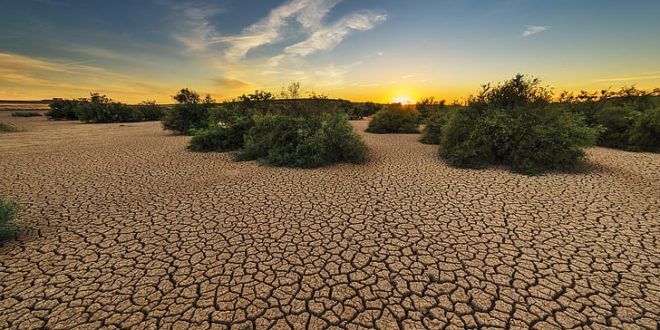The last decade has seen a number of climate-related phenomena that have had a significant impact on the environment and life on Earth. The climate events that have hit the Earth due to climate change, such as floods, hurricanes, and droughts, have caused loss of life and property and have affected the environment and its biodiversity.
Humanity has always enjoyed many of the benefits brought by industrial and technological development, but those benefits have come at a high price. The use of fossil fuels and the increase in greenhouse gas emissions have led to a gradual rise in the Earth’s temperature.
This climate change has put humanity on the brink of a precipice in the face of these changes that have become an existential threat to humans on this planet. Scientific data indicates that the average global surface temperature has risen significantly during this period, resulting in the melting of ice in the Arctic and Antarctic and a rise in sea and ocean levels by millimeters.
In addition to rising temperatures, the Earth has seen an increase in the frequency of destructive natural phenomena such as hurricanes, floods, and droughts. Scientific studies say that there is a relationship between climate change and the increase in the frequency of these phenomena, as rising temperatures and changes in rainfall patterns can lead to increased weather fluctuations and the recurrence of natural disasters.
In addition, climate change affects agriculture and food production, as droughts and changes in rainfall patterns can lead to a shortage of water resources and the deterioration of soil quality, which affects the ability to cultivate crops and produce food.
We cannot ignore the negative environmental impacts that have resulted from climate change over the past ten years. We have seen an increase in pollution and the deterioration of air and water quality. With rising temperatures, the proportion of harmful emissions and the periods of their spread in the air have increased, leading to air pollution and damage to living organisms and the environment.
In addition, the effects of climate change on living organisms and biodiversity have led to an increase in the spread of some living organisms and an increase in the risk of extinction of some of them, which has reflected its negative effects on the environmental balance and ecological systems.
The changes and phenomena associated with climate change also have social implications, as people in some areas are still suffering from a shortage of fresh water and a shortage of natural resources, which has affected their daily lives and put them in front of new challenges in the fields of agriculture, health, and housing.
The negative impacts of climate change require urgent action to mitigate them. Among the most important of these measures are:
- Reducing greenhouse gas emissions: This can be done by switching to renewable energy sources, rationalizing energy use, and improving resource efficiency.
- Adapting to the effects of climate change: This can be done by developing plans and programs to deal with extreme climate events and enhancing the ability of communities to adapt to climate change.
Addressing climate change is a shared responsibility between countries, governments, and individuals. Through collective action, we can mitigate the effects of these changes and protect our  planet for future generations.
planet for future generations.
Climate change is a major global challenge that requires a comprehensive international cooperation to address it. Many governments, organizations, and businesses have begun to take steps to contribute to combating climate change and reducing greenhouse gas emissions, but these efforts remain insufficient.
International climate agreements
It is clear that climate change is a global challenge that requires comprehensive international cooperation to address it. It is also important to encourage innovation in the field of clean energy and the use of environmental technologies to reduce harmful emissions and improve environmental quality.
International climate agreements aim to address the impacts of climate change and reduce global greenhouse gas emissions. These agreements are essential to strengthening global cooperation in combating climate change.
- The United Nations Framework Convention on Climate Change (UNFCCC) is an international environmental treaty adopted at the United Nations Conference on Environment and Development (UNCED) in Rio de Janeiro in 1992. It is the foundation for global efforts to combat climate change. The Convention sets the general framework for government efforts to address climate change, including annual Conferences of the Parties where countries discuss and negotiate policies and measures to be taken to combat climate change.
- The Kyoto Protocol is an international treaty adopted in 1997 and entered into force in 2005. It is one of the most important agreements that established legal obligations for developed countries to reduce their greenhouse gas emissions. The Protocol provided mechanisms such as emissions trading, joint implementation, and the Clean Development Mechanism to help achieve these objectives. Although the Kyoto Protocol has been largely superseded by the Paris Agreement, it played a critical role in shaping international climate change policies.
- The Paris Agreement is a landmark international agreement adopted in 2015 under the UNFCCC. It aims to keep the increase in the global average temperature well below 2 degrees Celsius above pre-industrial levels and to pursue efforts to limit the increase to 1.5 degrees Celsius. It is one of the most important international agreements reached by the international community. Unlike the Kyoto Protocol, the Paris Agreement includes commitments from both developed and developing countries. Each country is required to determine and regularly update its Nationally Determined Contribution (NDC) to reduce climate change.
- The Montreal Protocol is another important international agreement on climate change. Although the Protocol is not specifically aimed at climate change, it is an international treaty that aims to eliminate the production and use of substances that deplete the ozone layer. The successful implementation of the Montreal Protocol has led to a significant reduction in greenhouse gas emissions, as many of the substances regulated by the Protocol are also potent greenhouse gases. The Protocol is considered an example of successful international cooperation in addressing environmental challenges.
These and other agreements form the basis for global action on climate change, setting goals and frameworks for countries to cooperate towards a more sustainable and low-carbon future. In addition, international institutions such as the Intergovernmental Panel on Climate Change (IPCC) play a critical role in providing scientific assessments to countries and negotiators on climate change around the world.
Some of the main policies and measures that can be taken to address the challenges of climate change:
- Reducing greenhouse gas emissions: This can be achieved by adopting policies that shift to clean energy sources such as solar and wind power, by enhancing energy efficiency, and by reducing the use of fossil fuels.
- Promoting sustainability: This can be achieved by implementing policies that conserve natural resources such as forests, by promoting sustainable agriculture, and by promoting sustainable urban planning.
- Enhancing research and innovation: This can be achieved by supporting technological innovation and scientific research in the field of clean energy technology and environmental technologies to develop new solutions to address climate challenges. This is one of the most important demands of developing countries, as it contributes to the capacity of countries to adapt and become more resilient, to find the least costly and environmentally friendly solutions, and to promote international cooperation in combating climate change, as the damage affects all of humanity.
- Raising environmental awareness: This can be a critical element in achieving the goals of combating climate change. It can help people to understand the changes and increase awareness of the impact of climate change on the environment and humanity. It can also contribute to people’s ability to create conditions that help to adapt to climate change.
Author: Halima Wasel
 الشبكة اليمنية للعلوم والبيئة (يمن ساينس) موقع يهتم بأخبار العلوم والتكنولوجيا والصحة والبيئة والسكان
الشبكة اليمنية للعلوم والبيئة (يمن ساينس) موقع يهتم بأخبار العلوم والتكنولوجيا والصحة والبيئة والسكان





